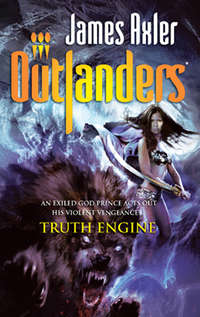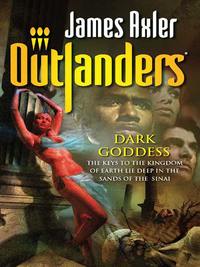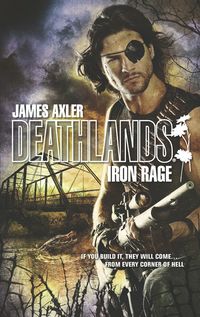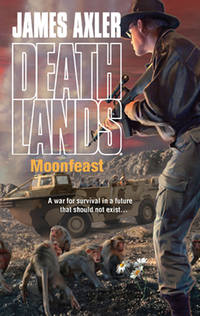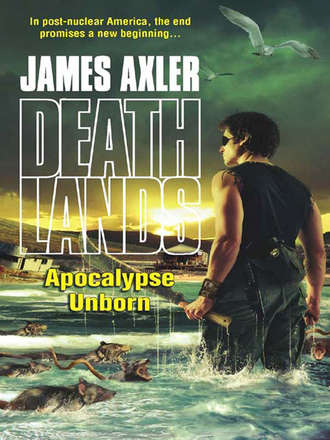
Полная версия
Apocalypse Unborn
At that moment two of the passengers yanked out their nose plugs and jumped overboard. They swam around the stern of the ship, through the wake, stroking hard for the island. To forestall a further stampede into the water, the crew fired their AKs in the air.
All the passengers lined up along the stern, watching the deserters grow smaller and smaller, still swimming with great determination toward the alien and deadly shore. Even Ryan seemed fascinated by their slow, steady progress. Krysty noted with satisfaction that her lover displayed no spectacular trouser effects from the pheromones.
The ship sailed on, turning southeast, and the cove slipped out of sight. By the time the swimmers reached the beach, they were too far away for their screams to be heard over the wind singing in the lines.
That same sea breeze blew away the last of the sirens’ perfume. Some of the passengers began weeping into their palms, as if they had lost their true loves. Krysty was amazed to see crazy, murdering scum acting like brokenhearted teenagers—grieving, inconsolable, their humanity revealed by an illusion of biochemistry.
Gradually the bereft bastards recovered their senses. After an hour, they couldn’t remember any of it. Not the island, not the sirens, not the pain of separation. Total brain fog. The less dramatically affected passengers remembered, though, and taking the public displays of sorrow for signs of weakness marked the criers for an early death.
Driven by a steady twelve-knot wind, the ship plowed on. The fore and aft rocking motion and the hiss of the hull was soothing, even stupefying after the sleepless night. Krysty dozed for hours in the warm sun. When she awoke, Mildred was by her side, watching over her.
Krysty rose from the deck and took in an even more dismal vista.
“That’s where Los Angeles used to be,” Mildred said, her voice gone suddenly hoarse with emotion.
It looked positively primeval. Plumes of molten lava and caustic smoke jetted from the black tips of emerging seamounts. A rain of superheated ejecta swept across the sea, hissing like fifty thousand snakes. Scattered lakes of flame danced on the surface from petrochemicals that had oozed up from the bottom.
On the land, volcanic cones thousands of feet tall spewed ash clouds, creating a low ceiling of gray that blocked out the blue sky to the east. Everything in that direction was tinged with yellow, smoke-filtered light. The bases of the Sierra Nevada in the distance were barely visible for the haze of sulphur and particulate matter.
“It’s a graveyard,” Mildred said after a moment, “for as far as you see. Millions of people died here on nuke day. There used to be a central core of skyscrapers and gridwork streets filling the great basin, edge to edge, stretching to the desert in the east. Whatever the fireballs and nukeblasts left behind, geologic forces have toppled and buried. Los Angeles has been scraped clean of everything human and everything made by human hands.”
“What about the radiation?” Krysty asked. “Is the place poisoned?”
“Definitely,” Mildred said. “See anything flying over it? Anything swimming in it?”
“What about us? Aren’t we too close?”
“Moot point, I’m afraid. What few extra rads we might pick up in passing aren’t going to make us ill. The eruptions are the real problem. They’ve been sending radioactive material aloft, into the upper atmosphere for more than a century. All that stuff has to come down somewhere. In fact, it comes down everywhere.”
“Then we’ve been breathing it and eating it all of our lives. But none of us are sick, though.”
“Short of a massive dose of gamma rays, radiation doesn’t kill its victims quickly. It can take decades for the damage from lesser levels of exposure to show up as cancer. Even folks with terrible superficial burns sometimes recover—whitecoats found that out after Hiroshima, Nagasaki and Chernobyl. It’s a matter of genetic luck and total rad exposure. Most people in Deathlands don’t live long enough for the sickness to ever show up. They get chilled by other things first.”
“Look at that!” Krysty exclaimed, pointing at a sudden commotion on the surface, about 150 yards from the ship and five miles off the hellish, uninhabitable coast. It was definitely not volcanic. A huge living creature thrashed and rolled out there. It was at least thirty feet long, and splashing fountains of water tinged with gallons of blood.
“It’s a whale,” the black woman said. “And it’s under attack.”
Only when the animal stopped thrashing could Krysty see it clearly. The barnacle-covered skin along its flanks was torn to shreds, torn through the thick white layer of blubber, gory pits gnawed into the dark purple meat. Though the whale floated quietly, gathering the last of its strength, the surface around it churned and humped.
There were things in the bright red water.
Much smaller creatures. Streaking pale, people-size shapes.
They were tearing at it from underneath. Hundreds of them.
The whale smashed the water with its tail flukes, fighting in vain to drive off the horde.
From the helm, Captain Eng bellowed through his megaphone for more sail. The deck crew leaped to the task. As the additional canvas dropped and filled, the ship surged ahead, pulling away from the carnage.
“What is it?” Krysty demanded of a passing crewman. “What is it?”
The islander did not turn, and he did not answer.
W HEN SUPPERTIME CAME , Krysty and Mildred joined the others assigned to the second feeding shift. The galley’s tabletops were covered with slick film of fried fish oil, and littered with discarded squid beaks and shrimp shells. Krysty had to take off her coat to keep from getting the mess on the long fur. After a day to recover, she found her appetite had returned with a vengeance. Ignoring the gut bomb sensation that came from swallowing cupfuls of grease, she chewed the golden crispy bits. She paused to spit out the larger bones and scales, then reached in the trough for another handful.
Krysty was using her back molars to tackle a particularly tough and rubbery hunk of squid, when from the deck above came shouting, then the ship’s bell began ringing. First crew, then passengers abandoned their dinners and rushed for the stairs. Krysty and Mildred joined the throng.
Above deck, the wind was dying down; the sea was a polished mirror.
Off the bow, framed by a sunset of orange and salmon-pink reflecting off the smooth water, of bloodred underlighting the tiers of volcanic clouds to the east, lay a ship slightly smaller than their own, painted black and brown. Instead of three masts, it had two, each rigged for four sets of sails.
It was adrift, riding low as if overloaded or in the process of sinking. Its canvas was torn and hanging in strips, its cables broken, trailing in the water. Nothing moved on deck. A few oil lamps glowed weakly; all the others were extinguished. It looked like they had been burning since the night before.
Captain Eng cut a wide, cautious circle around the vessel, then began to spiral closer. Every time he turned downwind, an awful stench engulfed them. The stench of death. Facing the foul, carrion breeze, the crew began to mutter and moan.
When they got a little closer, Krysty could see the wreck was a wooden ship. A coastal cargo trader, like theirs. Overlapping planks formed the hull; there were holes in it above the water line. Dozens of them. They didn’t look like damage from cannon shot. Their edges were ripped out, not blown in. The holes were big enough for a person to crawl through.
Behind them, the captain of the Taniwha tea turned his face to the sky and screamed like a wounded animal.
Chapter Six
Eng barked orders through his steel megaphone.
Ryan didn’t understand the islander language, but the meaning became obvious as the crew scurried to pull in the sails. The white ship glided to a stop, upwind of the derelict vessel and its pall of death.
Eng barked again, and Ryan was forced back from the rail as islanders rushed to open a blaster and prepare the cannon for firing. They unblocked the wheels, removed muzzle plug and fuse hole cap and rolled the weapon forward on its tracks.
Likewise, every cannon on the starboard rail was readied to broadside the brigantine that foundered just forty yards away.
Because the two-master was so much lower in the water, Ryan could look down on its main deck, which was a wreck. Cables, ropes and chains lay in tangled heaps; tool chests and worktables were overturned. Some of top-deck cargo had come loose from its safety netting: huge bags of grain had broken and spilled.
The chem storm could have done all that, easily, Ryan thought. It was less likely, though still possible, that the storm had tossed every living soul overboard.
But no way could it have torn those holes in the hull.
Up close, Ryan could see marks where the black paint had been pulled off, masses of overlapping, tiny circles that exposed the bare wood beneath. The marks led directly from the water line to the ragged hull breaches. Paths of popped paint. They weren’t made by bullet impacts or grappling hooks or ballpeen hammers. Something had climbed up from the sea, up the side of the ship in great numbers, and once there, had gnawed and ripped through the inches-thick hull planks.
All the bullet holes were on the main deck; the gunwhales, the superstructure and the masts were absolutely riddled. The scuppers gleamed with a litter of spent brass. Certainly thousands, maybe tens of thousands of rounds had been fired. Apparently to no avail. In broad swatches, congealed blood glazed the deck like purple varnish.
Along the Taniwha tea ’s rail, between the cannons, other crewmen took positions with their Kalashnikovs and rocket-propelled grenades, ready to put up covering fire for the longboat that had already been lowered into the water on the port side.
Sunset, like a second Armageddon, lit the ruined ship and the rapidly moving longboat. As six rowers pulled hard, a seventh islander stood braced in the bow, his AK shouldered and aimed.
No targets appeared.
Nothing stirred on the opposite deck.
Shipping their oars, the rowers tethered the longboat to the side of the brigantine. Captain Eng ordered his cannoneers and riflemen to hold their fire as the boarding party deftly scrambled up the broken lines and cables onto the main deck. Once there, they fanned out with assault rifles, sweeping the area, kicking over anything that could hide an attacker, quickly confirming there were no signs of life—or death.
The boarders then split up, entering the fore and aft companionways in a simultaneous rush. After a few minutes belowdecks, the crewmen spilled back into view and immediately lurched to the rail, coughing and gasping for air.
Eng raised the megaphone and shouted an unintelligible question across the gap.
One of the boarders raised his head and drew a forefinger across the front of his throat.
All dead.
A quiver of shock ran through the white frigate’s crew. They were stunned speechless.
Ryan turned to look at the captain. Under the man’s heavy brow ridge, glistening stripes, tear tracks ran down his scarified cheeks. Blood trickled over and off his broad chin, dripping upon his chest. He had sunk his sharpened teeth into his lip.
A moment later the groaning and lamentations began.
Passengers watched uneasily, hands on weapons, as the islanders wept openly, as they beat their chests and pulled at their own hair. Ryan figured that they not only knew the dead crew, but were probably related. Only ties of blood could wring forth such grief.
Meanwhile, the boarders hastily departed the death ship. They didn’t pause to rifle the cargo on the main deck, which seemed strange to Ryan, as it was there for the taking, and in great quantities. They climbed back onto the Taniwha tea , seven hard men shaken to the core by what they had seen.
The bowrider stepped up to the captain, reached out a trembling hand and carefully placed a half-dozen gold rings on his palm. Rings of great weight, fashioned to fit huge fingers, like his.
Eng clutched them in a white-knuckled fist. Raising the megaphone to his bloody mouth, he bellowed another urgent command. The crew scrambled to reset the sails.
The islanders were abandoning their dead.
Only now there was barely enough wind to put the iron ship in motion. It crept slowly south for about twenty minutes, then the wind died off altogether. They hadn’t sailed far. Ryan could still see the silhouette of the derelict on the horizon, backlit in crimson.
When the wind went slack, it got very quiet. Quiet enough to hear a faint croaking noise from high above them.
At the captain’s signal, the crew began lowering the upside-down crucifix from just below the crow’s nest.
The bird creature nailed to it was still alive. Still talking, albeit in a weak, rasping voice.
“See?” the flying mutie said to Eng as the cross came to rest on the deck. “The wind is gone. I can’t bring it back. I can’t bring it back because I have no power over it. Never had. Never will. It’s superstition that makes you think my kind has any control over the wind. Blind superstition. We ride it, that’s all. We ride it in the air just like you ride it on the water. Please, let me go, now. Please, I’m begging. My suffering is worth nothing to you.”
Eng gripped the handle of a machete proffered by one of the crew. Using the cross beneath as a chopping block, he swung the blade down in a blur, and in one swipe hacked off the bird man’s head at the neck. While crewmen pried the nails from twitching feet and wings, the captain planted the severed, startled head on a vacant roof spike.
Suffering had decorative value.
Deathlands kitsch.
“Porangi!” the captain shouted at the passengers, spraying blood and spit out the big end of his megaphone, and waving impatiently for them to step forward. “Death swims these waters,” he howled. “It is closer than you can imagine. It will find us long before dawn. Without wind, we cannot sail away to safety. Without wind, we must stand and fight.”
“Fight what?” a familiar voice demanded.
Ryan turned and saw Jak Lauren, arms folded, a defiant scowl on his white face, his ruby-red eyes glittering with menace.
“The taua ,” Eng said. “That is our name for them. Things that swim and crawl. Things that climb and leap. Broad-tailed, slime-covered things. The taua roam the southern sea shelf in great schools, killing and eating every creature they find. These are no triple-stupe, pea-brained fishes. They are organized, like a war party. Some among us believe they were once human. Now they breathe the air like porpoises, through the tops of their heads. They talk to each other under water. They swim faster than the fastest sailing ship. They chill with their razor teeth and the suckers on their hands and feet. They eat only flesh, the fresher the better. Last night, the taua slaughtered and ate my cousin Karetu and his crew. They pulled his ship apart to get at him. For islanders, revenge is a duty, and a pleasure. The creatures who have stolen our blood, shall give their blood. In buckets…”
The crew standing behind the passengers sent up a howl, shaking their AKs in the air.
“This ship is not as easy to break into as Karetu’s,” Eng continued. “When the taua come to chill us, we will face them and take their lives. You porangi are welcome to stand and fight at our side. Those who are too afraid to fight the taua should go belowdecks. Don’t block the stairways. Get in your bunks. Hide under your mattresses, and pray for dawn.”
“And if things get inside ship?” Jak said.
“ Taua can’t rip through iron, little korako ,” Eng told him. “But they will wear out their teeth and sucker hands trying. We will take our bloody vengeance on them, then pull back from battle. Below the metal decks, we are safe. They can’t sink this ship. They must eat to live. They will move on by daybreak, in search of easier meals.”
Only a couple of passengers decided to go below and wait out the conflict. To the rest, it sounded like big fun. Like shooting fish in a barrel, despite the fact that Eng had said these foes were nothing like fish. The assembled scum of Deathlands began checking their weapons.
Ryan carefully set the Steyr butt-first in a lidless plastic drum, leaning the forestock against the rim. This wasn’t going to be a long-range battle; it was going to be nose-to-nose. Or perhaps nose-to-blowhole. He unholstered his SIG-Sauer and racked the slide back a half inch, making sure the chamber held a live round. After checking his front pockets for spare full magazines, he tested the release of his eighteen-inch panga knife from its leg sheath. It came out of the scabbard like it was spring-loaded.
When he looked up, the sky had changed from red to lavender. Out on the placid sea, in the distance, Ryan saw scattered disturbances. Boils. Rings. Bubbles. Signifying movements just beneath the surface. He couldn’t tell what was making them. Only that whatever it was, it was big—and plentiful.
The captain ordered all the fixed deck lamps lit. From covered storage bins along the rails, islanders hauled out dozens more of the oil lamps, which they fired up and hung from the ends of long metal poles. At intervals around the perimeter they extended the poles over the gunwhales and lashed them in place, illuminating a broad stretch of the surrounding water as darkness closed on the drifting ship.
Ryan moved to a corner of the stern, beside one of the racks of red, fifty-five-gallon barrels. The taua were coming, no doubt about that. Even without the boils and splashes, he could feel them, like a pressure, building on all sides, and from beneath. Without the wind, the night was very warm. Humid. He wiped the sweat from his gun hand on to his pant leg.
Конец ознакомительного фрагмента.
Текст предоставлен ООО «ЛитРес».
Прочитайте эту книгу целиком, купив полную легальную версию на ЛитРес.
Безопасно оплатить книгу можно банковской картой Visa, MasterCard, Maestro, со счета мобильного телефона, с платежного терминала, в салоне МТС или Связной, через PayPal, WebMoney, Яндекс.Деньги, QIWI Кошелек, бонусными картами или другим удобным Вам способом.



